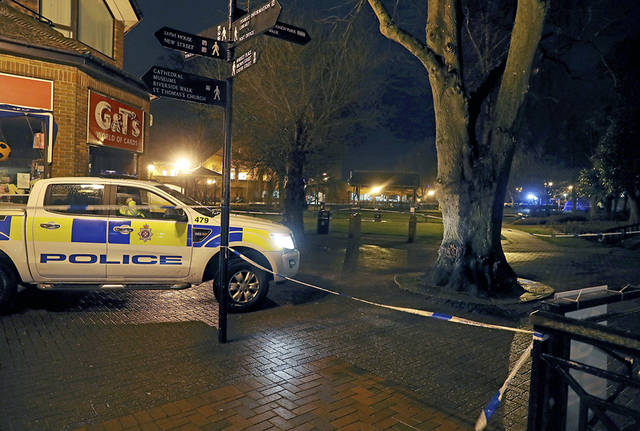A Russian who spied for Britain falls ill

ASSOCIATED PRESS
Police cordon off the area near the Maltings in Salisbury, England, where British media reported Monday that a former Russian spy was in critical condition after coming into contact with an “unknown substance” on Sunday.
A man identified by local news reports as a retired Russian military intelligence officer who once spied for Britain is critically ill at a British hospital, and officials were investigating his “exposure to an unknown substance.”
According to several reports, the man, found unconscious on a bench in the city of Salisbury, is Sergei V. Skripal, 66. He was once jailed by Moscow, then settled in Britain after an exchange of spies between the United States and Russia in 2010.
The British police have not publicly identified the man in the hospital or a 33-year-old woman who fell sick with him at a shopping mall called the Maltings.
Officials have, however, released enough detail about what they called a “major incident” to draw some comparisons, however premature, to the case of Alexander V. Litvinenko, a former Russian spy who was poisoned in London in 2006.
Litvinenko, who was 43, died in November 2006 after ingesting polonium 210, a rare radioactive isotope that investigators later found in high concentrations in a teapot at a central London hotel where the victim had met with Russian associates. That episode caused an international outcry and led to years of tension between the British and Russian governments.
In a statement Monday, the Wiltshire police, who cover the Salisbury area, said the man and the woman, who are believed to know each other, were found at about 4:15 p.m. Sunday and taken to Salisbury District Hospital. They had no visible injuries.
Don't miss out on what's happening!
Stay in touch with breaking news, as it happens, conveniently in your email inbox. It's FREE!
“They are currently being treated for suspected exposure to an unknown substance,” the statement said. Both were in intensive care, it said.
The police said a major incident, with a “multiagency response,” had been declared.
“At this stage it is not yet clear if a crime has been committed,” they said in a Twitter post, adding that they are “carrying out a full investigation & working with partner agencies, to clarify exact circumstances.”
The priority, the police said, is to identify any substances involved. They said they were working with experts to make a speedy diagnosis to ensure “appropriate and timely treatment.”
The temporary assistant chief constable, Craig Holden, said that the police were keeping “an open mind,” about what had happened, and that specialists were helping them “to understand what we are or aren’t dealing with at this time.”
A local news organization, The Salisbury Journal, reported that emergency services suspected the drug fentanyl, a powerful synthetic opioid, may have been involved, though there was no police confirmation of that.
The male victim was taken to the hospital by car, while the woman was airlifted, said The Journal, which published pictures of firefighters in special gear decontaminating an area of the city.
The police have said that several locations in Salisbury were cordoned off as part of the investigation, but that they did not believe there was any risk to the wider public.
The BBC, which was among the news organizations that identified the victim as Skripal, reported that neighbors of his home in Salisbury described him as friendly. They said he had lost his wife in recent years.
It also quoted an eyewitness, Freya Church, who said that it looked like the two people taken ill Sunday had taken “something quite strong.”
“On the bench there was a couple, an older guy and a younger girl,” Church told the broadcaster. “She was sort of leaned in on him; it looked like she had passed out maybe.”
“He was doing some strange hand movements, looking up to the sky,” she said, adding that “they looked so out of it I thought even if I did step in, I wasn’t sure how I could help.”
On Monday, the hospital in Salisbury, a city in southern England, said it was dealing “with a major incident involving a small number of casualties, with a multiagency response.”
Skripal is a retired colonel in Russia’s military intelligence service. He was convicted in 2006 of having passed classified information to British intelligence, MI6, for a decade, in return for $100,000 wired to a bank account in Spain.
At the time of his conviction, the Federal Security Service, the domestic successor to the Soviet KGB, said in statements to Russian news agencies that Skripal began spying in 1995 while stationed overseas. His espionage activities were said to have continued even after he retired from the Russian military in 1999.
According to those reports, he met regularly with British handlers and was paid each time, as well as in monthly installments into a bank account in Spain, the statements said. The newspaper Izvestia, which first reported the case, said the British were interested in the identities of Russian officers working in Europe.
© 2018 The New York Times Company



